Inclusive Practice: Promoting Equality in Education Report
VerifiedAdded on 2023/01/06
|21
|7112
|61
Report
AI Summary
This report provides a comprehensive overview of inclusive practice in primary education. It begins by defining inclusive practice and outlining its purpose and benefits in the context of education and training. The report then explores the social and cultural factors that impact learning, including cultural differences, religious challenges, language barriers, and the need for multi-cultural education. It further analyzes the impact of cognitive, physical, and sensory abilities on learning, emphasizing the importance of addressing these factors. A significant portion of the report reviews relevant policies and legislative frameworks that influence a primary school and teacher's practice of inclusion, highlighting human rights-based approaches. The report also discusses the purpose of referral points and the professionals a teacher can collaborate with to promote inclusion. It analyzes how teachers can promote inclusion, equality, and value diversity in the classroom, summarizing their roles and responsibilities. The report concludes with a review of strategies for effective liaison between professionals involved in inclusive practice and an analysis of ways to review the effectiveness of inclusive practice, including identifying strengths, areas for improvement, and an action plan for improvement.
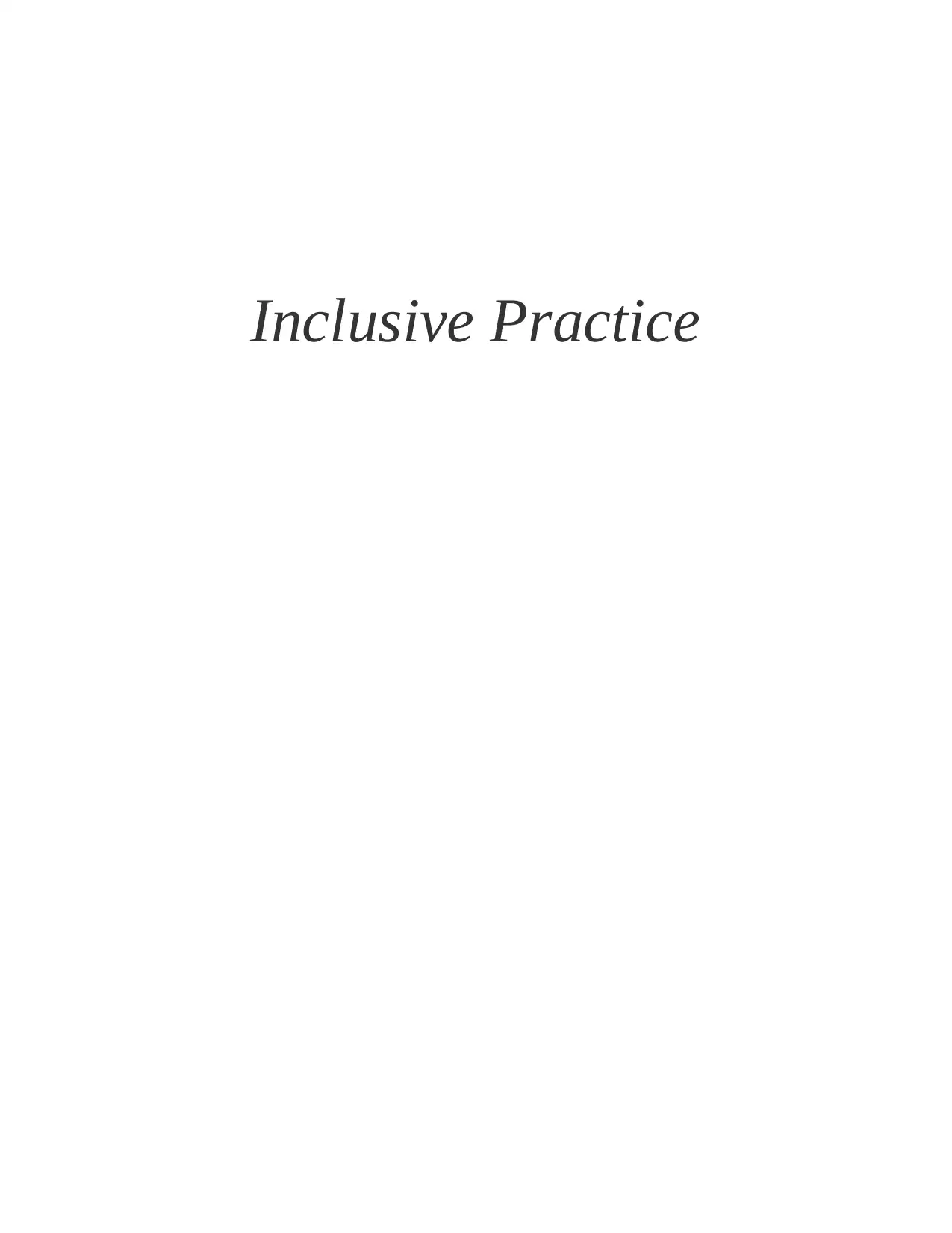
Inclusive Practice
Paraphrase This Document
Need a fresh take? Get an instant paraphrase of this document with our AI Paraphraser
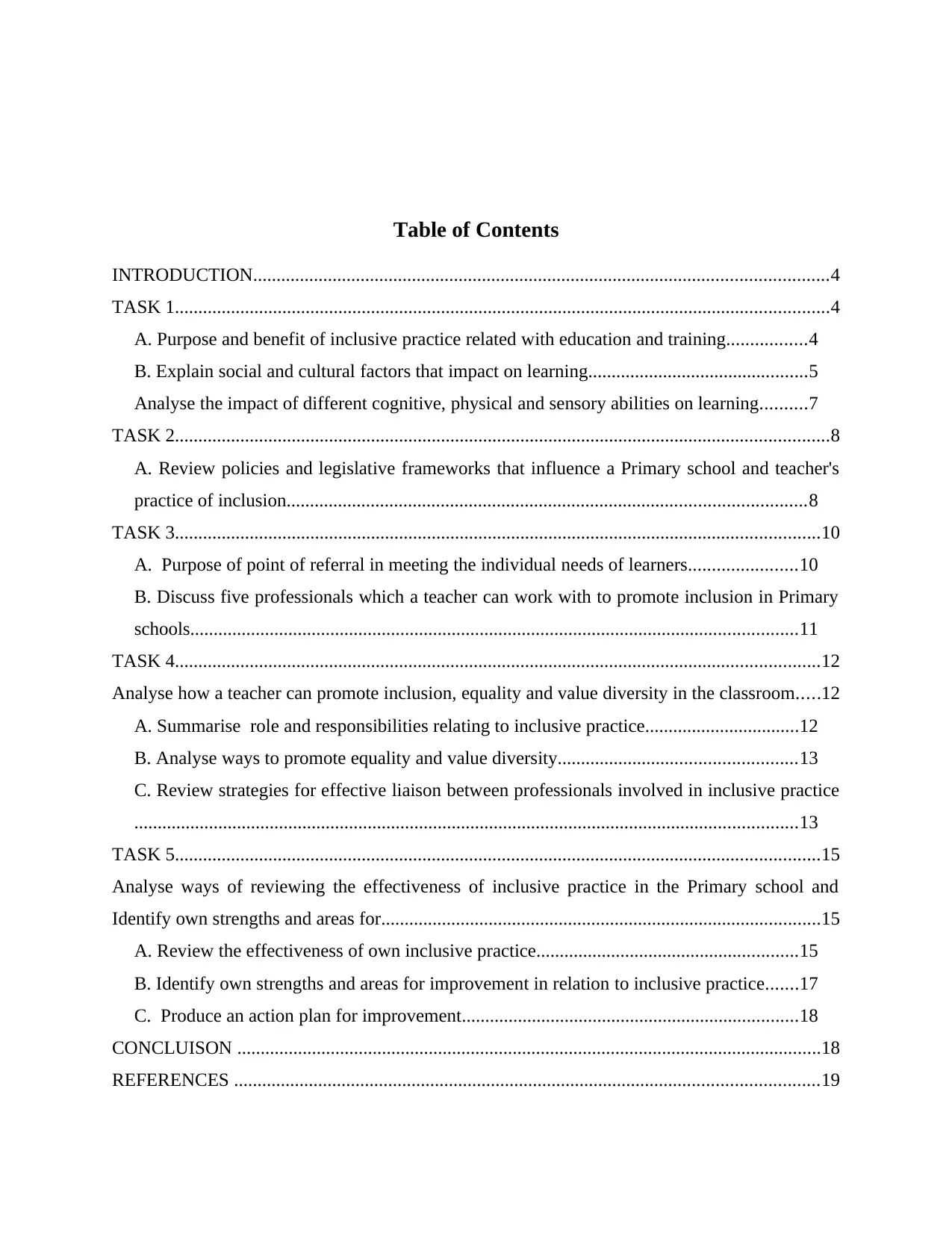
Table of Contents
INTRODUCTION...........................................................................................................................4
TASK 1............................................................................................................................................4
A. Purpose and benefit of inclusive practice related with education and training.................4
B. Explain social and cultural factors that impact on learning...............................................5
Analyse the impact of different cognitive, physical and sensory abilities on learning..........7
TASK 2............................................................................................................................................8
A. Review policies and legislative frameworks that influence a Primary school and teacher's
practice of inclusion...............................................................................................................8
TASK 3..........................................................................................................................................10
A. Purpose of point of referral in meeting the individual needs of learners.......................10
B. Discuss five professionals which a teacher can work with to promote inclusion in Primary
schools..................................................................................................................................11
TASK 4..........................................................................................................................................12
Analyse how a teacher can promote inclusion, equality and value diversity in the classroom.....12
A. Summarise role and responsibilities relating to inclusive practice.................................12
B. Analyse ways to promote equality and value diversity...................................................13
C. Review strategies for effective liaison between professionals involved in inclusive practice
..............................................................................................................................................13
TASK 5..........................................................................................................................................15
Analyse ways of reviewing the effectiveness of inclusive practice in the Primary school and
Identify own strengths and areas for..............................................................................................15
A. Review the effectiveness of own inclusive practice........................................................15
B. Identify own strengths and areas for improvement in relation to inclusive practice.......17
C. Produce an action plan for improvement........................................................................18
CONCLUISON .............................................................................................................................18
REFERENCES .............................................................................................................................19
INTRODUCTION...........................................................................................................................4
TASK 1............................................................................................................................................4
A. Purpose and benefit of inclusive practice related with education and training.................4
B. Explain social and cultural factors that impact on learning...............................................5
Analyse the impact of different cognitive, physical and sensory abilities on learning..........7
TASK 2............................................................................................................................................8
A. Review policies and legislative frameworks that influence a Primary school and teacher's
practice of inclusion...............................................................................................................8
TASK 3..........................................................................................................................................10
A. Purpose of point of referral in meeting the individual needs of learners.......................10
B. Discuss five professionals which a teacher can work with to promote inclusion in Primary
schools..................................................................................................................................11
TASK 4..........................................................................................................................................12
Analyse how a teacher can promote inclusion, equality and value diversity in the classroom.....12
A. Summarise role and responsibilities relating to inclusive practice.................................12
B. Analyse ways to promote equality and value diversity...................................................13
C. Review strategies for effective liaison between professionals involved in inclusive practice
..............................................................................................................................................13
TASK 5..........................................................................................................................................15
Analyse ways of reviewing the effectiveness of inclusive practice in the Primary school and
Identify own strengths and areas for..............................................................................................15
A. Review the effectiveness of own inclusive practice........................................................15
B. Identify own strengths and areas for improvement in relation to inclusive practice.......17
C. Produce an action plan for improvement........................................................................18
CONCLUISON .............................................................................................................................18
REFERENCES .............................................................................................................................19
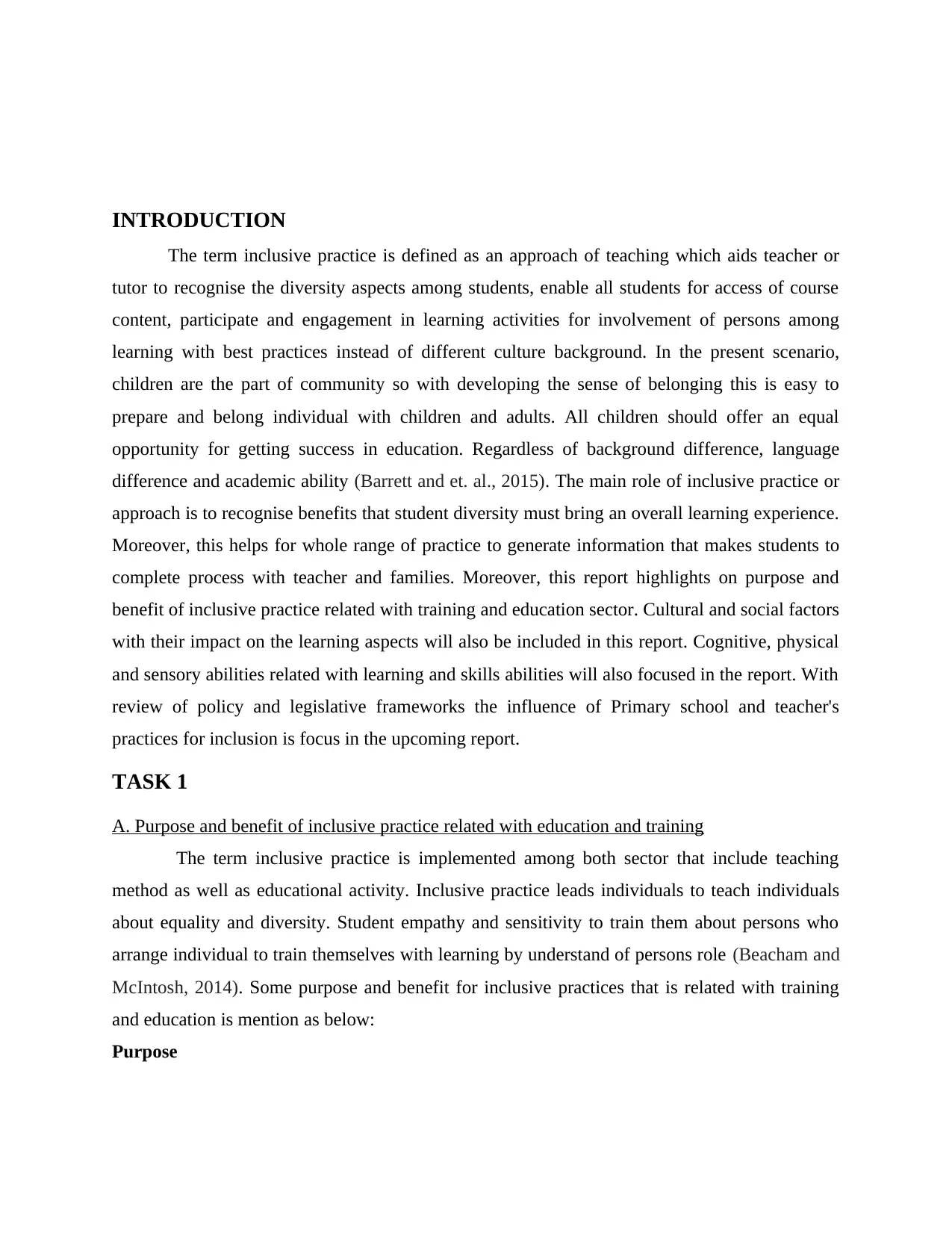
INTRODUCTION
The term inclusive practice is defined as an approach of teaching which aids teacher or
tutor to recognise the diversity aspects among students, enable all students for access of course
content, participate and engagement in learning activities for involvement of persons among
learning with best practices instead of different culture background. In the present scenario,
children are the part of community so with developing the sense of belonging this is easy to
prepare and belong individual with children and adults. All children should offer an equal
opportunity for getting success in education. Regardless of background difference, language
difference and academic ability (Barrett and et. al., 2015). The main role of inclusive practice or
approach is to recognise benefits that student diversity must bring an overall learning experience.
Moreover, this helps for whole range of practice to generate information that makes students to
complete process with teacher and families. Moreover, this report highlights on purpose and
benefit of inclusive practice related with training and education sector. Cultural and social factors
with their impact on the learning aspects will also be included in this report. Cognitive, physical
and sensory abilities related with learning and skills abilities will also focused in the report. With
review of policy and legislative frameworks the influence of Primary school and teacher's
practices for inclusion is focus in the upcoming report.
TASK 1
A. Purpose and benefit of inclusive practice related with education and training
The term inclusive practice is implemented among both sector that include teaching
method as well as educational activity. Inclusive practice leads individuals to teach individuals
about equality and diversity. Student empathy and sensitivity to train them about persons who
arrange individual to train themselves with learning by understand of persons role (Beacham and
McIntosh, 2014). Some purpose and benefit for inclusive practices that is related with training
and education is mention as below:
Purpose
The term inclusive practice is defined as an approach of teaching which aids teacher or
tutor to recognise the diversity aspects among students, enable all students for access of course
content, participate and engagement in learning activities for involvement of persons among
learning with best practices instead of different culture background. In the present scenario,
children are the part of community so with developing the sense of belonging this is easy to
prepare and belong individual with children and adults. All children should offer an equal
opportunity for getting success in education. Regardless of background difference, language
difference and academic ability (Barrett and et. al., 2015). The main role of inclusive practice or
approach is to recognise benefits that student diversity must bring an overall learning experience.
Moreover, this helps for whole range of practice to generate information that makes students to
complete process with teacher and families. Moreover, this report highlights on purpose and
benefit of inclusive practice related with training and education sector. Cultural and social factors
with their impact on the learning aspects will also be included in this report. Cognitive, physical
and sensory abilities related with learning and skills abilities will also focused in the report. With
review of policy and legislative frameworks the influence of Primary school and teacher's
practices for inclusion is focus in the upcoming report.
TASK 1
A. Purpose and benefit of inclusive practice related with education and training
The term inclusive practice is implemented among both sector that include teaching
method as well as educational activity. Inclusive practice leads individuals to teach individuals
about equality and diversity. Student empathy and sensitivity to train them about persons who
arrange individual to train themselves with learning by understand of persons role (Beacham and
McIntosh, 2014). Some purpose and benefit for inclusive practices that is related with training
and education is mention as below:
Purpose
⊘ This is a preview!⊘
Do you want full access?
Subscribe today to unlock all pages.

Trusted by 1+ million students worldwide
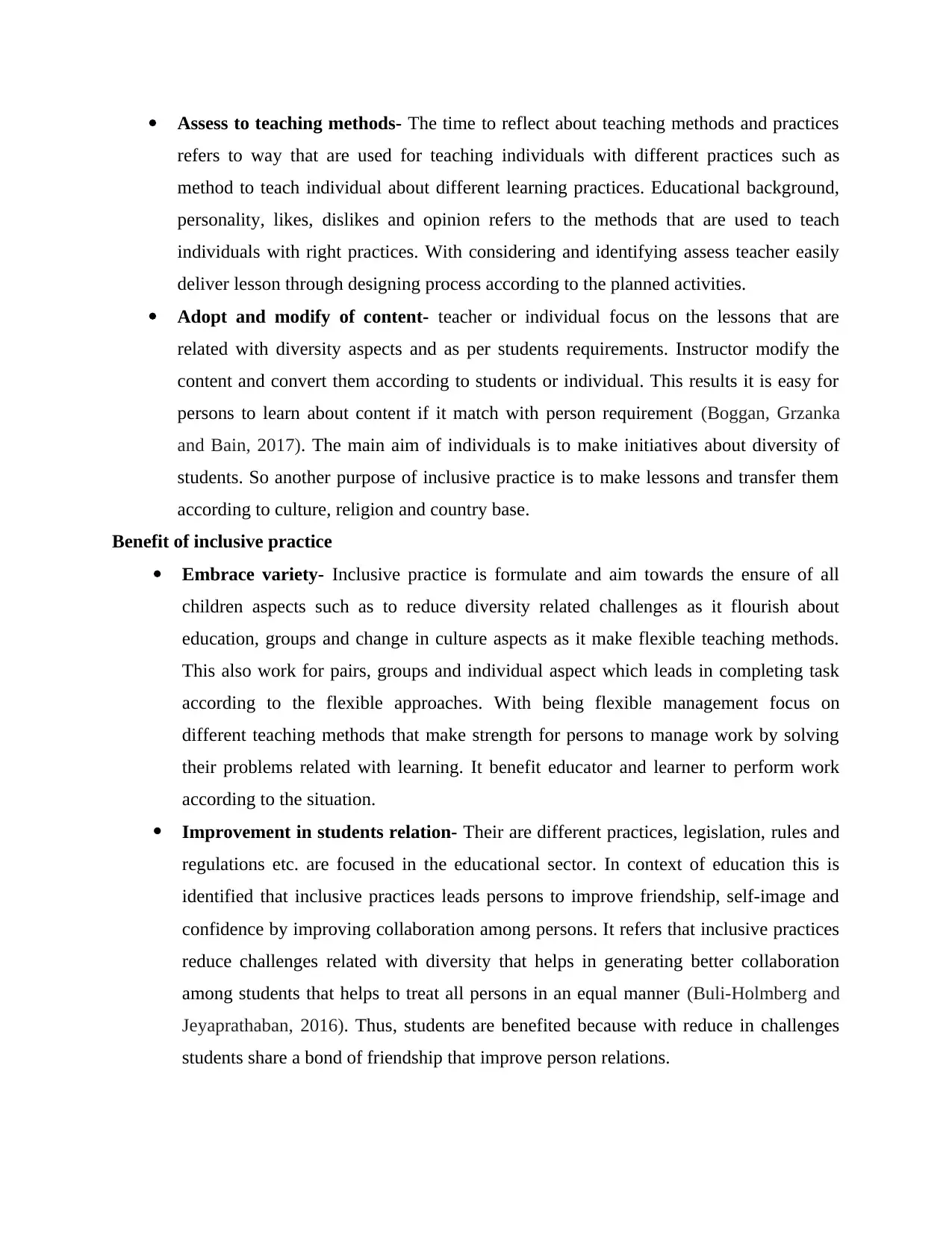
Assess to teaching methods- The time to reflect about teaching methods and practices
refers to way that are used for teaching individuals with different practices such as
method to teach individual about different learning practices. Educational background,
personality, likes, dislikes and opinion refers to the methods that are used to teach
individuals with right practices. With considering and identifying assess teacher easily
deliver lesson through designing process according to the planned activities.
Adopt and modify of content- teacher or individual focus on the lessons that are
related with diversity aspects and as per students requirements. Instructor modify the
content and convert them according to students or individual. This results it is easy for
persons to learn about content if it match with person requirement (Boggan, Grzanka
and Bain, 2017). The main aim of individuals is to make initiatives about diversity of
students. So another purpose of inclusive practice is to make lessons and transfer them
according to culture, religion and country base.
Benefit of inclusive practice
Embrace variety- Inclusive practice is formulate and aim towards the ensure of all
children aspects such as to reduce diversity related challenges as it flourish about
education, groups and change in culture aspects as it make flexible teaching methods.
This also work for pairs, groups and individual aspect which leads in completing task
according to the flexible approaches. With being flexible management focus on
different teaching methods that make strength for persons to manage work by solving
their problems related with learning. It benefit educator and learner to perform work
according to the situation.
Improvement in students relation- Their are different practices, legislation, rules and
regulations etc. are focused in the educational sector. In context of education this is
identified that inclusive practices leads persons to improve friendship, self-image and
confidence by improving collaboration among persons. It refers that inclusive practices
reduce challenges related with diversity that helps in generating better collaboration
among students that helps to treat all persons in an equal manner (Buli-Holmberg and
Jeyaprathaban, 2016). Thus, students are benefited because with reduce in challenges
students share a bond of friendship that improve person relations.
refers to way that are used for teaching individuals with different practices such as
method to teach individual about different learning practices. Educational background,
personality, likes, dislikes and opinion refers to the methods that are used to teach
individuals with right practices. With considering and identifying assess teacher easily
deliver lesson through designing process according to the planned activities.
Adopt and modify of content- teacher or individual focus on the lessons that are
related with diversity aspects and as per students requirements. Instructor modify the
content and convert them according to students or individual. This results it is easy for
persons to learn about content if it match with person requirement (Boggan, Grzanka
and Bain, 2017). The main aim of individuals is to make initiatives about diversity of
students. So another purpose of inclusive practice is to make lessons and transfer them
according to culture, religion and country base.
Benefit of inclusive practice
Embrace variety- Inclusive practice is formulate and aim towards the ensure of all
children aspects such as to reduce diversity related challenges as it flourish about
education, groups and change in culture aspects as it make flexible teaching methods.
This also work for pairs, groups and individual aspect which leads in completing task
according to the flexible approaches. With being flexible management focus on
different teaching methods that make strength for persons to manage work by solving
their problems related with learning. It benefit educator and learner to perform work
according to the situation.
Improvement in students relation- Their are different practices, legislation, rules and
regulations etc. are focused in the educational sector. In context of education this is
identified that inclusive practices leads persons to improve friendship, self-image and
confidence by improving collaboration among persons. It refers that inclusive practices
reduce challenges related with diversity that helps in generating better collaboration
among students that helps to treat all persons in an equal manner (Buli-Holmberg and
Jeyaprathaban, 2016). Thus, students are benefited because with reduce in challenges
students share a bond of friendship that improve person relations.
Paraphrase This Document
Need a fresh take? Get an instant paraphrase of this document with our AI Paraphraser
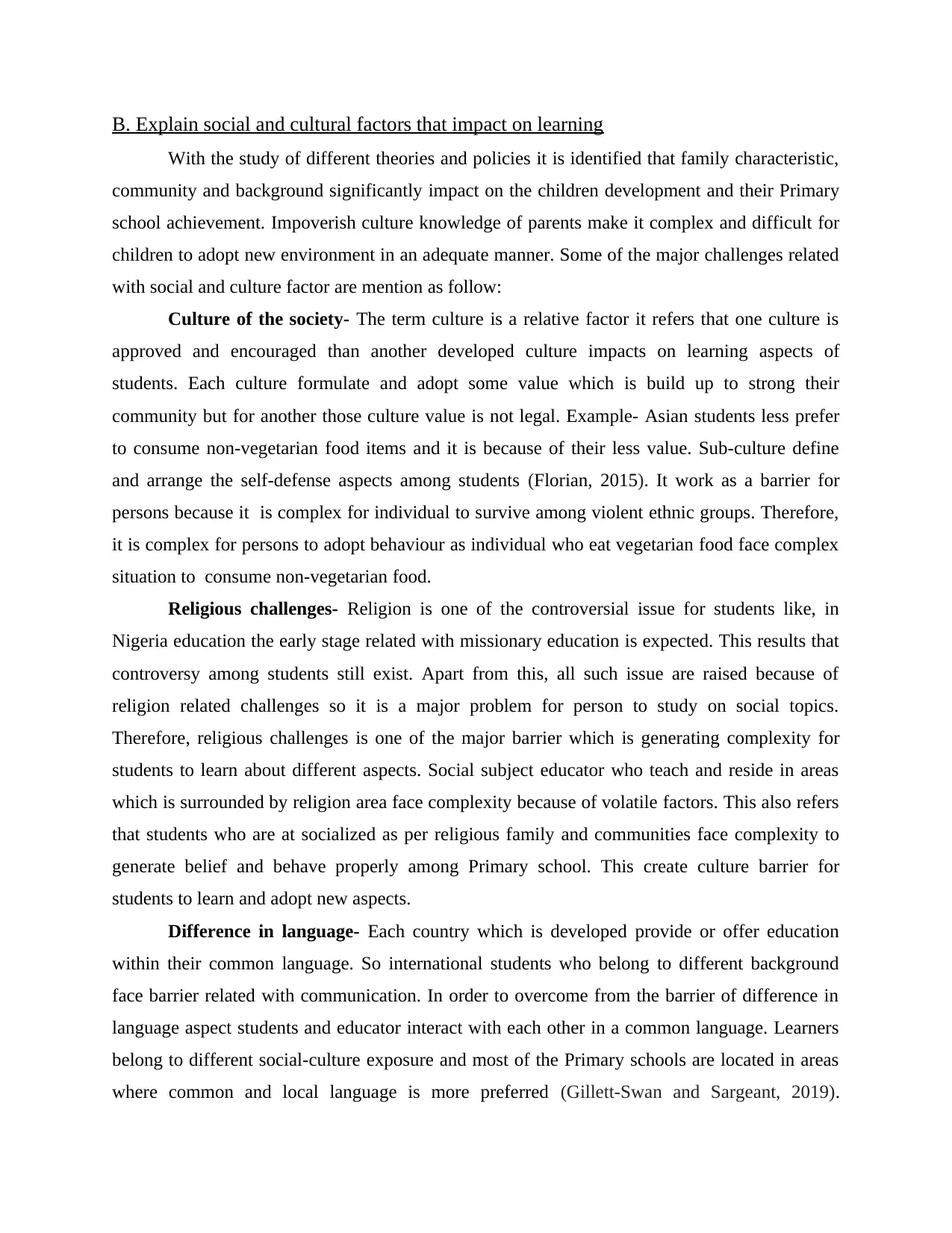
B. Explain social and cultural factors that impact on learning
With the study of different theories and policies it is identified that family characteristic,
community and background significantly impact on the children development and their Primary
school achievement. Impoverish culture knowledge of parents make it complex and difficult for
children to adopt new environment in an adequate manner. Some of the major challenges related
with social and culture factor are mention as follow:
Culture of the society- The term culture is a relative factor it refers that one culture is
approved and encouraged than another developed culture impacts on learning aspects of
students. Each culture formulate and adopt some value which is build up to strong their
community but for another those culture value is not legal. Example- Asian students less prefer
to consume non-vegetarian food items and it is because of their less value. Sub-culture define
and arrange the self-defense aspects among students (Florian, 2015). It work as a barrier for
persons because it is complex for individual to survive among violent ethnic groups. Therefore,
it is complex for persons to adopt behaviour as individual who eat vegetarian food face complex
situation to consume non-vegetarian food.
Religious challenges- Religion is one of the controversial issue for students like, in
Nigeria education the early stage related with missionary education is expected. This results that
controversy among students still exist. Apart from this, all such issue are raised because of
religion related challenges so it is a major problem for person to study on social topics.
Therefore, religious challenges is one of the major barrier which is generating complexity for
students to learn about different aspects. Social subject educator who teach and reside in areas
which is surrounded by religion area face complexity because of volatile factors. This also refers
that students who are at socialized as per religious family and communities face complexity to
generate belief and behave properly among Primary school. This create culture barrier for
students to learn and adopt new aspects.
Difference in language- Each country which is developed provide or offer education
within their common language. So international students who belong to different background
face barrier related with communication. In order to overcome from the barrier of difference in
language aspect students and educator interact with each other in a common language. Learners
belong to different social-culture exposure and most of the Primary schools are located in areas
where common and local language is more preferred (Gillett-Swan and Sargeant, 2019).
With the study of different theories and policies it is identified that family characteristic,
community and background significantly impact on the children development and their Primary
school achievement. Impoverish culture knowledge of parents make it complex and difficult for
children to adopt new environment in an adequate manner. Some of the major challenges related
with social and culture factor are mention as follow:
Culture of the society- The term culture is a relative factor it refers that one culture is
approved and encouraged than another developed culture impacts on learning aspects of
students. Each culture formulate and adopt some value which is build up to strong their
community but for another those culture value is not legal. Example- Asian students less prefer
to consume non-vegetarian food items and it is because of their less value. Sub-culture define
and arrange the self-defense aspects among students (Florian, 2015). It work as a barrier for
persons because it is complex for individual to survive among violent ethnic groups. Therefore,
it is complex for persons to adopt behaviour as individual who eat vegetarian food face complex
situation to consume non-vegetarian food.
Religious challenges- Religion is one of the controversial issue for students like, in
Nigeria education the early stage related with missionary education is expected. This results that
controversy among students still exist. Apart from this, all such issue are raised because of
religion related challenges so it is a major problem for person to study on social topics.
Therefore, religious challenges is one of the major barrier which is generating complexity for
students to learn about different aspects. Social subject educator who teach and reside in areas
which is surrounded by religion area face complexity because of volatile factors. This also refers
that students who are at socialized as per religious family and communities face complexity to
generate belief and behave properly among Primary school. This create culture barrier for
students to learn and adopt new aspects.
Difference in language- Each country which is developed provide or offer education
within their common language. So international students who belong to different background
face barrier related with communication. In order to overcome from the barrier of difference in
language aspect students and educator interact with each other in a common language. Learners
belong to different social-culture exposure and most of the Primary schools are located in areas
where common and local language is more preferred (Gillett-Swan and Sargeant, 2019).
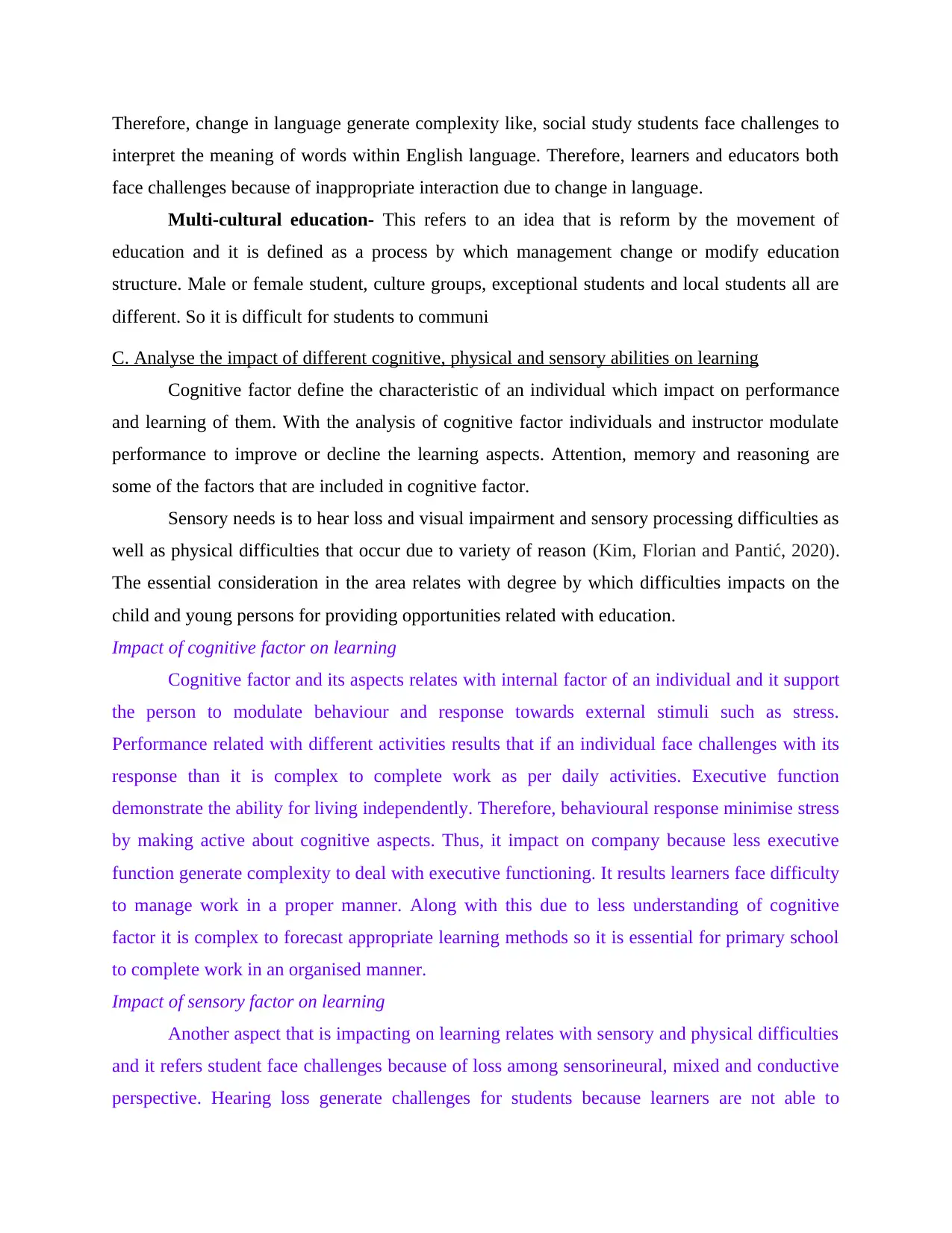
Therefore, change in language generate complexity like, social study students face challenges to
interpret the meaning of words within English language. Therefore, learners and educators both
face challenges because of inappropriate interaction due to change in language.
Multi-cultural education- This refers to an idea that is reform by the movement of
education and it is defined as a process by which management change or modify education
structure. Male or female student, culture groups, exceptional students and local students all are
different. So it is difficult for students to communi
C. Analyse the impact of different cognitive, physical and sensory abilities on learning
Cognitive factor define the characteristic of an individual which impact on performance
and learning of them. With the analysis of cognitive factor individuals and instructor modulate
performance to improve or decline the learning aspects. Attention, memory and reasoning are
some of the factors that are included in cognitive factor.
Sensory needs is to hear loss and visual impairment and sensory processing difficulties as
well as physical difficulties that occur due to variety of reason (Kim, Florian and Pantić, 2020).
The essential consideration in the area relates with degree by which difficulties impacts on the
child and young persons for providing opportunities related with education.
Impact of cognitive factor on learning
Cognitive factor and its aspects relates with internal factor of an individual and it support
the person to modulate behaviour and response towards external stimuli such as stress.
Performance related with different activities results that if an individual face challenges with its
response than it is complex to complete work as per daily activities. Executive function
demonstrate the ability for living independently. Therefore, behavioural response minimise stress
by making active about cognitive aspects. Thus, it impact on company because less executive
function generate complexity to deal with executive functioning. It results learners face difficulty
to manage work in a proper manner. Along with this due to less understanding of cognitive
factor it is complex to forecast appropriate learning methods so it is essential for primary school
to complete work in an organised manner.
Impact of sensory factor on learning
Another aspect that is impacting on learning relates with sensory and physical difficulties
and it refers student face challenges because of loss among sensorineural, mixed and conductive
perspective. Hearing loss generate challenges for students because learners are not able to
interpret the meaning of words within English language. Therefore, learners and educators both
face challenges because of inappropriate interaction due to change in language.
Multi-cultural education- This refers to an idea that is reform by the movement of
education and it is defined as a process by which management change or modify education
structure. Male or female student, culture groups, exceptional students and local students all are
different. So it is difficult for students to communi
C. Analyse the impact of different cognitive, physical and sensory abilities on learning
Cognitive factor define the characteristic of an individual which impact on performance
and learning of them. With the analysis of cognitive factor individuals and instructor modulate
performance to improve or decline the learning aspects. Attention, memory and reasoning are
some of the factors that are included in cognitive factor.
Sensory needs is to hear loss and visual impairment and sensory processing difficulties as
well as physical difficulties that occur due to variety of reason (Kim, Florian and Pantić, 2020).
The essential consideration in the area relates with degree by which difficulties impacts on the
child and young persons for providing opportunities related with education.
Impact of cognitive factor on learning
Cognitive factor and its aspects relates with internal factor of an individual and it support
the person to modulate behaviour and response towards external stimuli such as stress.
Performance related with different activities results that if an individual face challenges with its
response than it is complex to complete work as per daily activities. Executive function
demonstrate the ability for living independently. Therefore, behavioural response minimise stress
by making active about cognitive aspects. Thus, it impact on company because less executive
function generate complexity to deal with executive functioning. It results learners face difficulty
to manage work in a proper manner. Along with this due to less understanding of cognitive
factor it is complex to forecast appropriate learning methods so it is essential for primary school
to complete work in an organised manner.
Impact of sensory factor on learning
Another aspect that is impacting on learning relates with sensory and physical difficulties
and it refers student face challenges because of loss among sensorineural, mixed and conductive
perspective. Hearing loss generate challenges for students because learners are not able to
⊘ This is a preview!⊘
Do you want full access?
Subscribe today to unlock all pages.

Trusted by 1+ million students worldwide
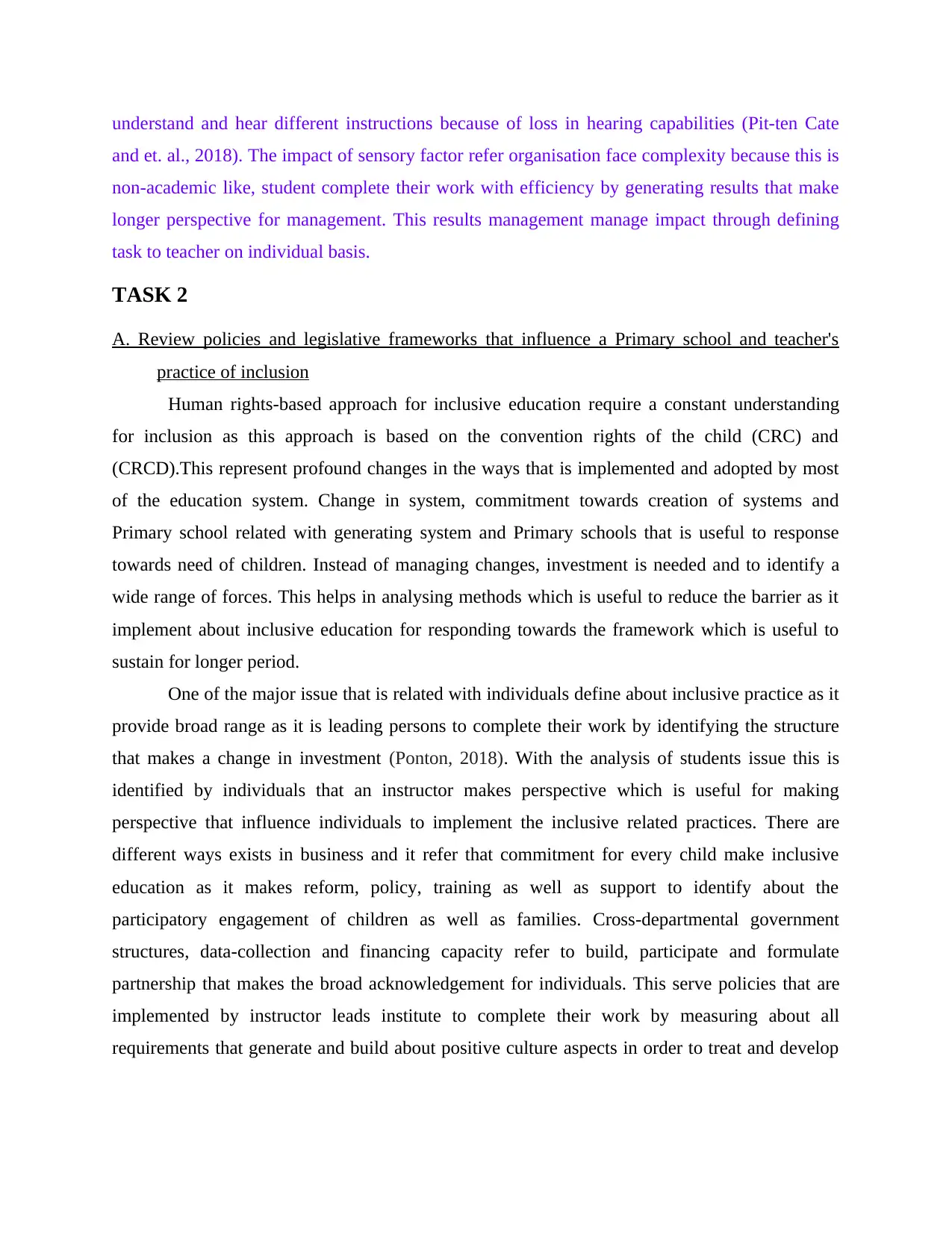
understand and hear different instructions because of loss in hearing capabilities (Pit-ten Cate
and et. al., 2018). The impact of sensory factor refer organisation face complexity because this is
non-academic like, student complete their work with efficiency by generating results that make
longer perspective for management. This results management manage impact through defining
task to teacher on individual basis.
TASK 2
A. Review policies and legislative frameworks that influence a Primary school and teacher's
practice of inclusion
Human rights-based approach for inclusive education require a constant understanding
for inclusion as this approach is based on the convention rights of the child (CRC) and
(CRCD).This represent profound changes in the ways that is implemented and adopted by most
of the education system. Change in system, commitment towards creation of systems and
Primary school related with generating system and Primary schools that is useful to response
towards need of children. Instead of managing changes, investment is needed and to identify a
wide range of forces. This helps in analysing methods which is useful to reduce the barrier as it
implement about inclusive education for responding towards the framework which is useful to
sustain for longer period.
One of the major issue that is related with individuals define about inclusive practice as it
provide broad range as it is leading persons to complete their work by identifying the structure
that makes a change in investment (Ponton, 2018). With the analysis of students issue this is
identified by individuals that an instructor makes perspective which is useful for making
perspective that influence individuals to implement the inclusive related practices. There are
different ways exists in business and it refer that commitment for every child make inclusive
education as it makes reform, policy, training as well as support to identify about the
participatory engagement of children as well as families. Cross-departmental government
structures, data-collection and financing capacity refer to build, participate and formulate
partnership that makes the broad acknowledgement for individuals. This serve policies that are
implemented by instructor leads institute to complete their work by measuring about all
requirements that generate and build about positive culture aspects in order to treat and develop
and et. al., 2018). The impact of sensory factor refer organisation face complexity because this is
non-academic like, student complete their work with efficiency by generating results that make
longer perspective for management. This results management manage impact through defining
task to teacher on individual basis.
TASK 2
A. Review policies and legislative frameworks that influence a Primary school and teacher's
practice of inclusion
Human rights-based approach for inclusive education require a constant understanding
for inclusion as this approach is based on the convention rights of the child (CRC) and
(CRCD).This represent profound changes in the ways that is implemented and adopted by most
of the education system. Change in system, commitment towards creation of systems and
Primary school related with generating system and Primary schools that is useful to response
towards need of children. Instead of managing changes, investment is needed and to identify a
wide range of forces. This helps in analysing methods which is useful to reduce the barrier as it
implement about inclusive education for responding towards the framework which is useful to
sustain for longer period.
One of the major issue that is related with individuals define about inclusive practice as it
provide broad range as it is leading persons to complete their work by identifying the structure
that makes a change in investment (Ponton, 2018). With the analysis of students issue this is
identified by individuals that an instructor makes perspective which is useful for making
perspective that influence individuals to implement the inclusive related practices. There are
different ways exists in business and it refer that commitment for every child make inclusive
education as it makes reform, policy, training as well as support to identify about the
participatory engagement of children as well as families. Cross-departmental government
structures, data-collection and financing capacity refer to build, participate and formulate
partnership that makes the broad acknowledgement for individuals. This serve policies that are
implemented by instructor leads institute to complete their work by measuring about all
requirements that generate and build about positive culture aspects in order to treat and develop
Paraphrase This Document
Need a fresh take? Get an instant paraphrase of this document with our AI Paraphraser
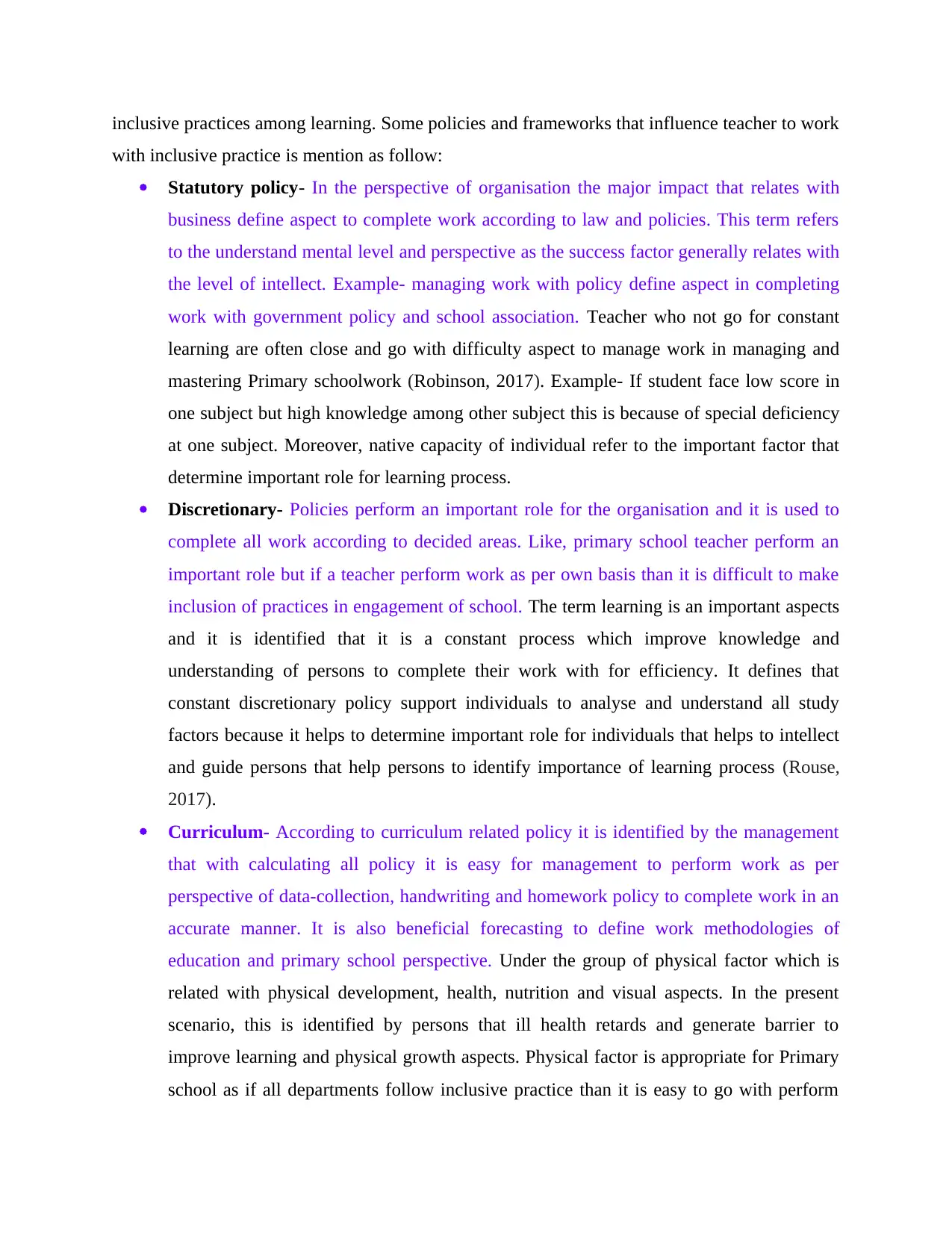
inclusive practices among learning. Some policies and frameworks that influence teacher to work
with inclusive practice is mention as follow:
Statutory policy- In the perspective of organisation the major impact that relates with
business define aspect to complete work according to law and policies. This term refers
to the understand mental level and perspective as the success factor generally relates with
the level of intellect. Example- managing work with policy define aspect in completing
work with government policy and school association. Teacher who not go for constant
learning are often close and go with difficulty aspect to manage work in managing and
mastering Primary schoolwork (Robinson, 2017). Example- If student face low score in
one subject but high knowledge among other subject this is because of special deficiency
at one subject. Moreover, native capacity of individual refer to the important factor that
determine important role for learning process.
Discretionary- Policies perform an important role for the organisation and it is used to
complete all work according to decided areas. Like, primary school teacher perform an
important role but if a teacher perform work as per own basis than it is difficult to make
inclusion of practices in engagement of school. The term learning is an important aspects
and it is identified that it is a constant process which improve knowledge and
understanding of persons to complete their work with for efficiency. It defines that
constant discretionary policy support individuals to analyse and understand all study
factors because it helps to determine important role for individuals that helps to intellect
and guide persons that help persons to identify importance of learning process (Rouse,
2017).
Curriculum- According to curriculum related policy it is identified by the management
that with calculating all policy it is easy for management to perform work as per
perspective of data-collection, handwriting and homework policy to complete work in an
accurate manner. It is also beneficial forecasting to define work methodologies of
education and primary school perspective. Under the group of physical factor which is
related with physical development, health, nutrition and visual aspects. In the present
scenario, this is identified by persons that ill health retards and generate barrier to
improve learning and physical growth aspects. Physical factor is appropriate for Primary
school as if all departments follow inclusive practice than it is easy to go with perform
with inclusive practice is mention as follow:
Statutory policy- In the perspective of organisation the major impact that relates with
business define aspect to complete work according to law and policies. This term refers
to the understand mental level and perspective as the success factor generally relates with
the level of intellect. Example- managing work with policy define aspect in completing
work with government policy and school association. Teacher who not go for constant
learning are often close and go with difficulty aspect to manage work in managing and
mastering Primary schoolwork (Robinson, 2017). Example- If student face low score in
one subject but high knowledge among other subject this is because of special deficiency
at one subject. Moreover, native capacity of individual refer to the important factor that
determine important role for learning process.
Discretionary- Policies perform an important role for the organisation and it is used to
complete all work according to decided areas. Like, primary school teacher perform an
important role but if a teacher perform work as per own basis than it is difficult to make
inclusion of practices in engagement of school. The term learning is an important aspects
and it is identified that it is a constant process which improve knowledge and
understanding of persons to complete their work with for efficiency. It defines that
constant discretionary policy support individuals to analyse and understand all study
factors because it helps to determine important role for individuals that helps to intellect
and guide persons that help persons to identify importance of learning process (Rouse,
2017).
Curriculum- According to curriculum related policy it is identified by the management
that with calculating all policy it is easy for management to perform work as per
perspective of data-collection, handwriting and homework policy to complete work in an
accurate manner. It is also beneficial forecasting to define work methodologies of
education and primary school perspective. Under the group of physical factor which is
related with physical development, health, nutrition and visual aspects. In the present
scenario, this is identified by persons that ill health retards and generate barrier to
improve learning and physical growth aspects. Physical factor is appropriate for Primary
school as if all departments follow inclusive practice than it is easy to go with perform
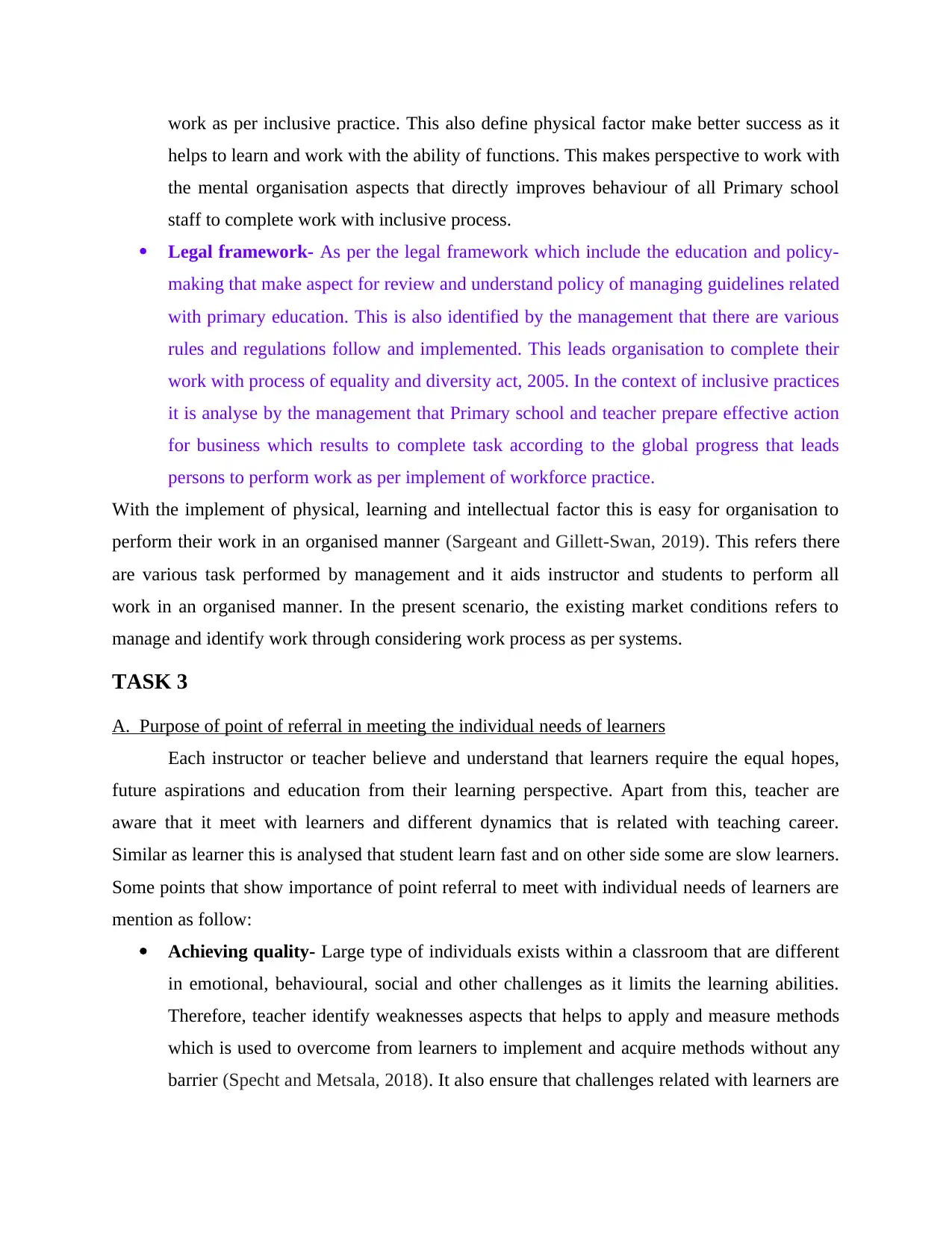
work as per inclusive practice. This also define physical factor make better success as it
helps to learn and work with the ability of functions. This makes perspective to work with
the mental organisation aspects that directly improves behaviour of all Primary school
staff to complete work with inclusive process.
Legal framework- As per the legal framework which include the education and policy-
making that make aspect for review and understand policy of managing guidelines related
with primary education. This is also identified by the management that there are various
rules and regulations follow and implemented. This leads organisation to complete their
work with process of equality and diversity act, 2005. In the context of inclusive practices
it is analyse by the management that Primary school and teacher prepare effective action
for business which results to complete task according to the global progress that leads
persons to perform work as per implement of workforce practice.
With the implement of physical, learning and intellectual factor this is easy for organisation to
perform their work in an organised manner (Sargeant and Gillett-Swan, 2019). This refers there
are various task performed by management and it aids instructor and students to perform all
work in an organised manner. In the present scenario, the existing market conditions refers to
manage and identify work through considering work process as per systems.
TASK 3
A. Purpose of point of referral in meeting the individual needs of learners
Each instructor or teacher believe and understand that learners require the equal hopes,
future aspirations and education from their learning perspective. Apart from this, teacher are
aware that it meet with learners and different dynamics that is related with teaching career.
Similar as learner this is analysed that student learn fast and on other side some are slow learners.
Some points that show importance of point referral to meet with individual needs of learners are
mention as follow:
Achieving quality- Large type of individuals exists within a classroom that are different
in emotional, behavioural, social and other challenges as it limits the learning abilities.
Therefore, teacher identify weaknesses aspects that helps to apply and measure methods
which is used to overcome from learners to implement and acquire methods without any
barrier (Specht and Metsala, 2018). It also ensure that challenges related with learners are
helps to learn and work with the ability of functions. This makes perspective to work with
the mental organisation aspects that directly improves behaviour of all Primary school
staff to complete work with inclusive process.
Legal framework- As per the legal framework which include the education and policy-
making that make aspect for review and understand policy of managing guidelines related
with primary education. This is also identified by the management that there are various
rules and regulations follow and implemented. This leads organisation to complete their
work with process of equality and diversity act, 2005. In the context of inclusive practices
it is analyse by the management that Primary school and teacher prepare effective action
for business which results to complete task according to the global progress that leads
persons to perform work as per implement of workforce practice.
With the implement of physical, learning and intellectual factor this is easy for organisation to
perform their work in an organised manner (Sargeant and Gillett-Swan, 2019). This refers there
are various task performed by management and it aids instructor and students to perform all
work in an organised manner. In the present scenario, the existing market conditions refers to
manage and identify work through considering work process as per systems.
TASK 3
A. Purpose of point of referral in meeting the individual needs of learners
Each instructor or teacher believe and understand that learners require the equal hopes,
future aspirations and education from their learning perspective. Apart from this, teacher are
aware that it meet with learners and different dynamics that is related with teaching career.
Similar as learner this is analysed that student learn fast and on other side some are slow learners.
Some points that show importance of point referral to meet with individual needs of learners are
mention as follow:
Achieving quality- Large type of individuals exists within a classroom that are different
in emotional, behavioural, social and other challenges as it limits the learning abilities.
Therefore, teacher identify weaknesses aspects that helps to apply and measure methods
which is used to overcome from learners to implement and acquire methods without any
barrier (Specht and Metsala, 2018). It also ensure that challenges related with learners are
⊘ This is a preview!⊘
Do you want full access?
Subscribe today to unlock all pages.

Trusted by 1+ million students worldwide
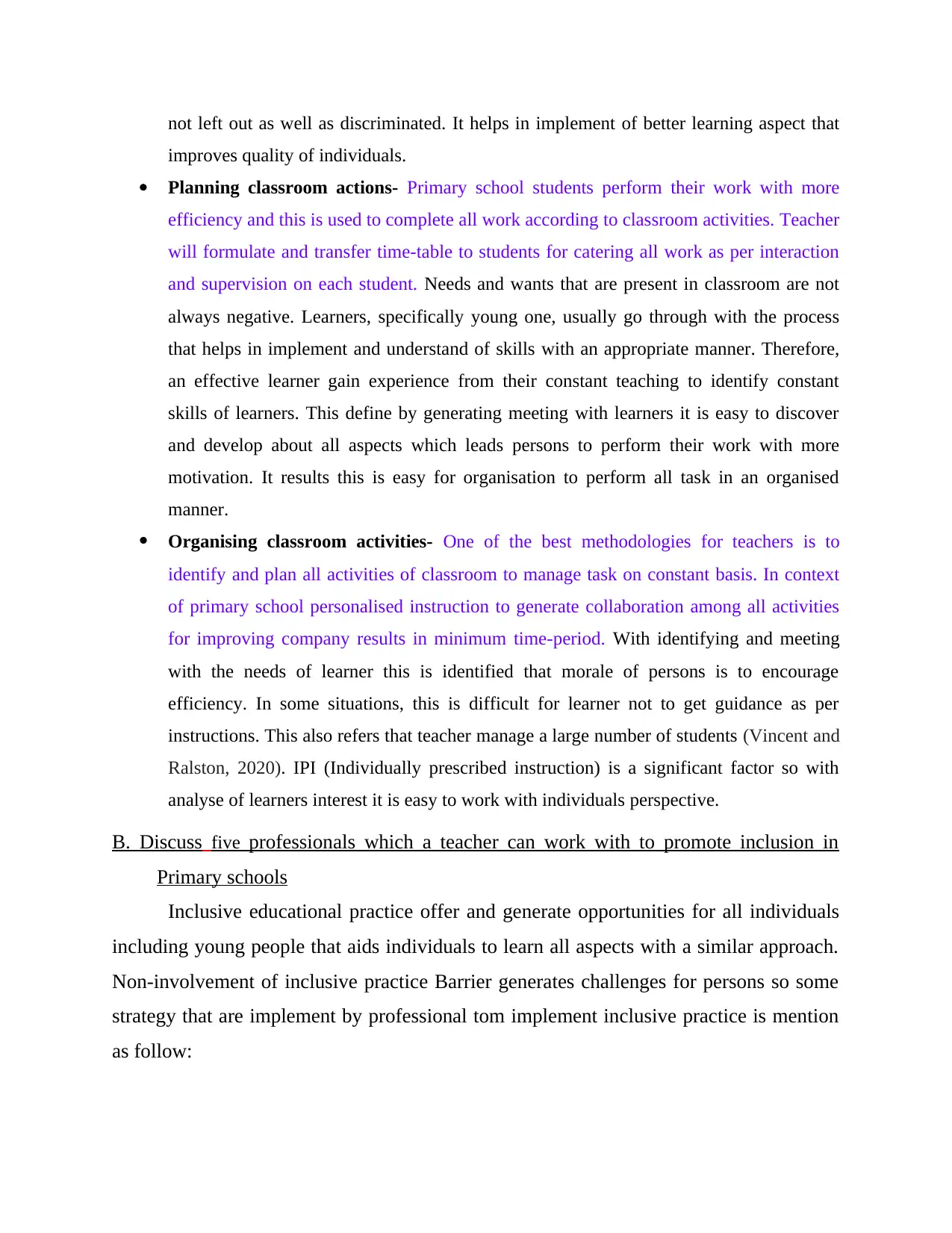
not left out as well as discriminated. It helps in implement of better learning aspect that
improves quality of individuals.
Planning classroom actions- Primary school students perform their work with more
efficiency and this is used to complete all work according to classroom activities. Teacher
will formulate and transfer time-table to students for catering all work as per interaction
and supervision on each student. Needs and wants that are present in classroom are not
always negative. Learners, specifically young one, usually go through with the process
that helps in implement and understand of skills with an appropriate manner. Therefore,
an effective learner gain experience from their constant teaching to identify constant
skills of learners. This define by generating meeting with learners it is easy to discover
and develop about all aspects which leads persons to perform their work with more
motivation. It results this is easy for organisation to perform all task in an organised
manner.
Organising classroom activities- One of the best methodologies for teachers is to
identify and plan all activities of classroom to manage task on constant basis. In context
of primary school personalised instruction to generate collaboration among all activities
for improving company results in minimum time-period. With identifying and meeting
with the needs of learner this is identified that morale of persons is to encourage
efficiency. In some situations, this is difficult for learner not to get guidance as per
instructions. This also refers that teacher manage a large number of students (Vincent and
Ralston, 2020). IPI (Individually prescribed instruction) is a significant factor so with
analyse of learners interest it is easy to work with individuals perspective.
B. Discuss five professionals which a teacher can work with to promote inclusion in
Primary schools
Inclusive educational practice offer and generate opportunities for all individuals
including young people that aids individuals to learn all aspects with a similar approach.
Non-involvement of inclusive practice Barrier generates challenges for persons so some
strategy that are implement by professional tom implement inclusive practice is mention
as follow:
improves quality of individuals.
Planning classroom actions- Primary school students perform their work with more
efficiency and this is used to complete all work according to classroom activities. Teacher
will formulate and transfer time-table to students for catering all work as per interaction
and supervision on each student. Needs and wants that are present in classroom are not
always negative. Learners, specifically young one, usually go through with the process
that helps in implement and understand of skills with an appropriate manner. Therefore,
an effective learner gain experience from their constant teaching to identify constant
skills of learners. This define by generating meeting with learners it is easy to discover
and develop about all aspects which leads persons to perform their work with more
motivation. It results this is easy for organisation to perform all task in an organised
manner.
Organising classroom activities- One of the best methodologies for teachers is to
identify and plan all activities of classroom to manage task on constant basis. In context
of primary school personalised instruction to generate collaboration among all activities
for improving company results in minimum time-period. With identifying and meeting
with the needs of learner this is identified that morale of persons is to encourage
efficiency. In some situations, this is difficult for learner not to get guidance as per
instructions. This also refers that teacher manage a large number of students (Vincent and
Ralston, 2020). IPI (Individually prescribed instruction) is a significant factor so with
analyse of learners interest it is easy to work with individuals perspective.
B. Discuss five professionals which a teacher can work with to promote inclusion in
Primary schools
Inclusive educational practice offer and generate opportunities for all individuals
including young people that aids individuals to learn all aspects with a similar approach.
Non-involvement of inclusive practice Barrier generates challenges for persons so some
strategy that are implement by professional tom implement inclusive practice is mention
as follow:
Paraphrase This Document
Need a fresh take? Get an instant paraphrase of this document with our AI Paraphraser
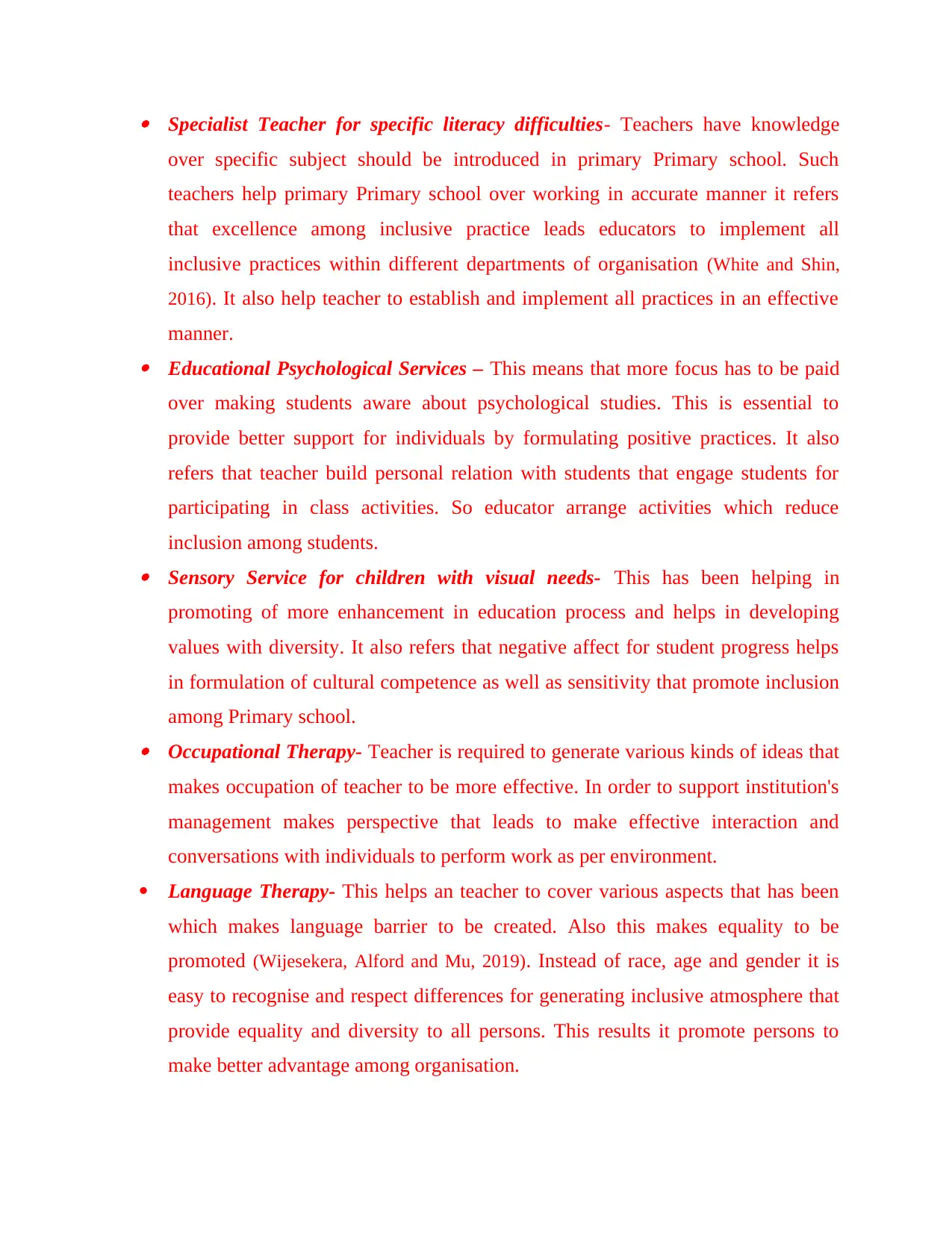
Specialist Teacher for specific literacy difficulties- Teachers have knowledge
over specific subject should be introduced in primary Primary school. Such
teachers help primary Primary school over working in accurate manner it refers
that excellence among inclusive practice leads educators to implement all
inclusive practices within different departments of organisation (White and Shin,
2016). It also help teacher to establish and implement all practices in an effective
manner. Educational Psychological Services – This means that more focus has to be paid
over making students aware about psychological studies. This is essential to
provide better support for individuals by formulating positive practices. It also
refers that teacher build personal relation with students that engage students for
participating in class activities. So educator arrange activities which reduce
inclusion among students. Sensory Service for children with visual needs- This has been helping in
promoting of more enhancement in education process and helps in developing
values with diversity. It also refers that negative affect for student progress helps
in formulation of cultural competence as well as sensitivity that promote inclusion
among Primary school. Occupational Therapy- Teacher is required to generate various kinds of ideas that
makes occupation of teacher to be more effective. In order to support institution's
management makes perspective that leads to make effective interaction and
conversations with individuals to perform work as per environment.
Language Therapy- This helps an teacher to cover various aspects that has been
which makes language barrier to be created. Also this makes equality to be
promoted (Wijesekera, Alford and Mu, 2019). Instead of race, age and gender it is
easy to recognise and respect differences for generating inclusive atmosphere that
provide equality and diversity to all persons. This results it promote persons to
make better advantage among organisation.
over specific subject should be introduced in primary Primary school. Such
teachers help primary Primary school over working in accurate manner it refers
that excellence among inclusive practice leads educators to implement all
inclusive practices within different departments of organisation (White and Shin,
2016). It also help teacher to establish and implement all practices in an effective
manner. Educational Psychological Services – This means that more focus has to be paid
over making students aware about psychological studies. This is essential to
provide better support for individuals by formulating positive practices. It also
refers that teacher build personal relation with students that engage students for
participating in class activities. So educator arrange activities which reduce
inclusion among students. Sensory Service for children with visual needs- This has been helping in
promoting of more enhancement in education process and helps in developing
values with diversity. It also refers that negative affect for student progress helps
in formulation of cultural competence as well as sensitivity that promote inclusion
among Primary school. Occupational Therapy- Teacher is required to generate various kinds of ideas that
makes occupation of teacher to be more effective. In order to support institution's
management makes perspective that leads to make effective interaction and
conversations with individuals to perform work as per environment.
Language Therapy- This helps an teacher to cover various aspects that has been
which makes language barrier to be created. Also this makes equality to be
promoted (Wijesekera, Alford and Mu, 2019). Instead of race, age and gender it is
easy to recognise and respect differences for generating inclusive atmosphere that
provide equality and diversity to all persons. This results it promote persons to
make better advantage among organisation.
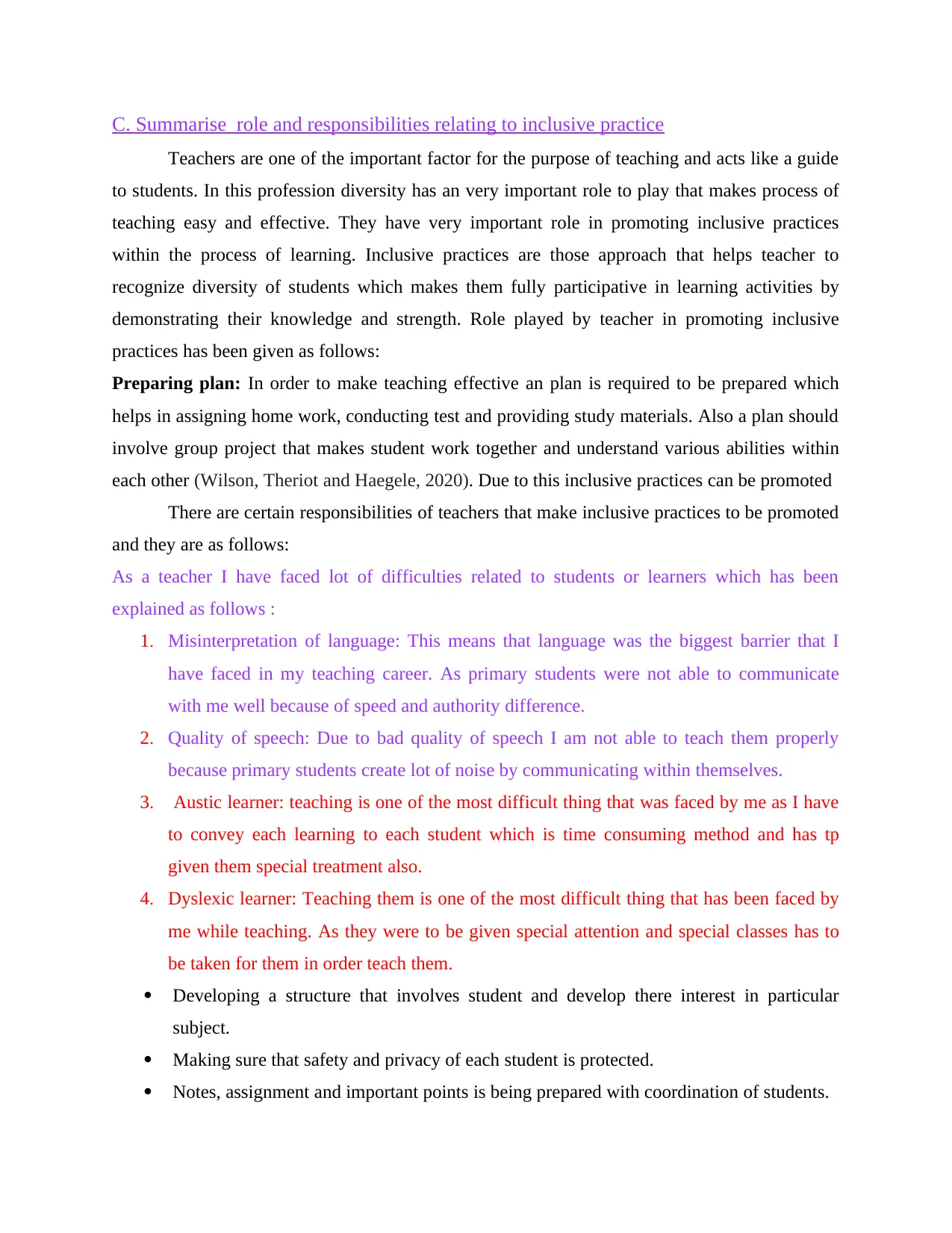
C. Summarise role and responsibilities relating to inclusive practice
Teachers are one of the important factor for the purpose of teaching and acts like a guide
to students. In this profession diversity has an very important role to play that makes process of
teaching easy and effective. They have very important role in promoting inclusive practices
within the process of learning. Inclusive practices are those approach that helps teacher to
recognize diversity of students which makes them fully participative in learning activities by
demonstrating their knowledge and strength. Role played by teacher in promoting inclusive
practices has been given as follows:
Preparing plan: In order to make teaching effective an plan is required to be prepared which
helps in assigning home work, conducting test and providing study materials. Also a plan should
involve group project that makes student work together and understand various abilities within
each other (Wilson, Theriot and Haegele, 2020). Due to this inclusive practices can be promoted
There are certain responsibilities of teachers that make inclusive practices to be promoted
and they are as follows:
As a teacher I have faced lot of difficulties related to students or learners which has been
explained as follows :
1. Misinterpretation of language: This means that language was the biggest barrier that I
have faced in my teaching career. As primary students were not able to communicate
with me well because of speed and authority difference.
2. Quality of speech: Due to bad quality of speech I am not able to teach them properly
because primary students create lot of noise by communicating within themselves.
3. Austic learner: teaching is one of the most difficult thing that was faced by me as I have
to convey each learning to each student which is time consuming method and has tp
given them special treatment also.
4. Dyslexic learner: Teaching them is one of the most difficult thing that has been faced by
me while teaching. As they were to be given special attention and special classes has to
be taken for them in order teach them.
Developing a structure that involves student and develop there interest in particular
subject.
Making sure that safety and privacy of each student is protected.
Notes, assignment and important points is being prepared with coordination of students.
Teachers are one of the important factor for the purpose of teaching and acts like a guide
to students. In this profession diversity has an very important role to play that makes process of
teaching easy and effective. They have very important role in promoting inclusive practices
within the process of learning. Inclusive practices are those approach that helps teacher to
recognize diversity of students which makes them fully participative in learning activities by
demonstrating their knowledge and strength. Role played by teacher in promoting inclusive
practices has been given as follows:
Preparing plan: In order to make teaching effective an plan is required to be prepared which
helps in assigning home work, conducting test and providing study materials. Also a plan should
involve group project that makes student work together and understand various abilities within
each other (Wilson, Theriot and Haegele, 2020). Due to this inclusive practices can be promoted
There are certain responsibilities of teachers that make inclusive practices to be promoted
and they are as follows:
As a teacher I have faced lot of difficulties related to students or learners which has been
explained as follows :
1. Misinterpretation of language: This means that language was the biggest barrier that I
have faced in my teaching career. As primary students were not able to communicate
with me well because of speed and authority difference.
2. Quality of speech: Due to bad quality of speech I am not able to teach them properly
because primary students create lot of noise by communicating within themselves.
3. Austic learner: teaching is one of the most difficult thing that was faced by me as I have
to convey each learning to each student which is time consuming method and has tp
given them special treatment also.
4. Dyslexic learner: Teaching them is one of the most difficult thing that has been faced by
me while teaching. As they were to be given special attention and special classes has to
be taken for them in order teach them.
Developing a structure that involves student and develop there interest in particular
subject.
Making sure that safety and privacy of each student is protected.
Notes, assignment and important points is being prepared with coordination of students.
⊘ This is a preview!⊘
Do you want full access?
Subscribe today to unlock all pages.

Trusted by 1+ million students worldwide
1 out of 21
Related Documents
Your All-in-One AI-Powered Toolkit for Academic Success.
+13062052269
info@desklib.com
Available 24*7 on WhatsApp / Email
![[object Object]](/_next/static/media/star-bottom.7253800d.svg)
Unlock your academic potential
Copyright © 2020–2026 A2Z Services. All Rights Reserved. Developed and managed by ZUCOL.





